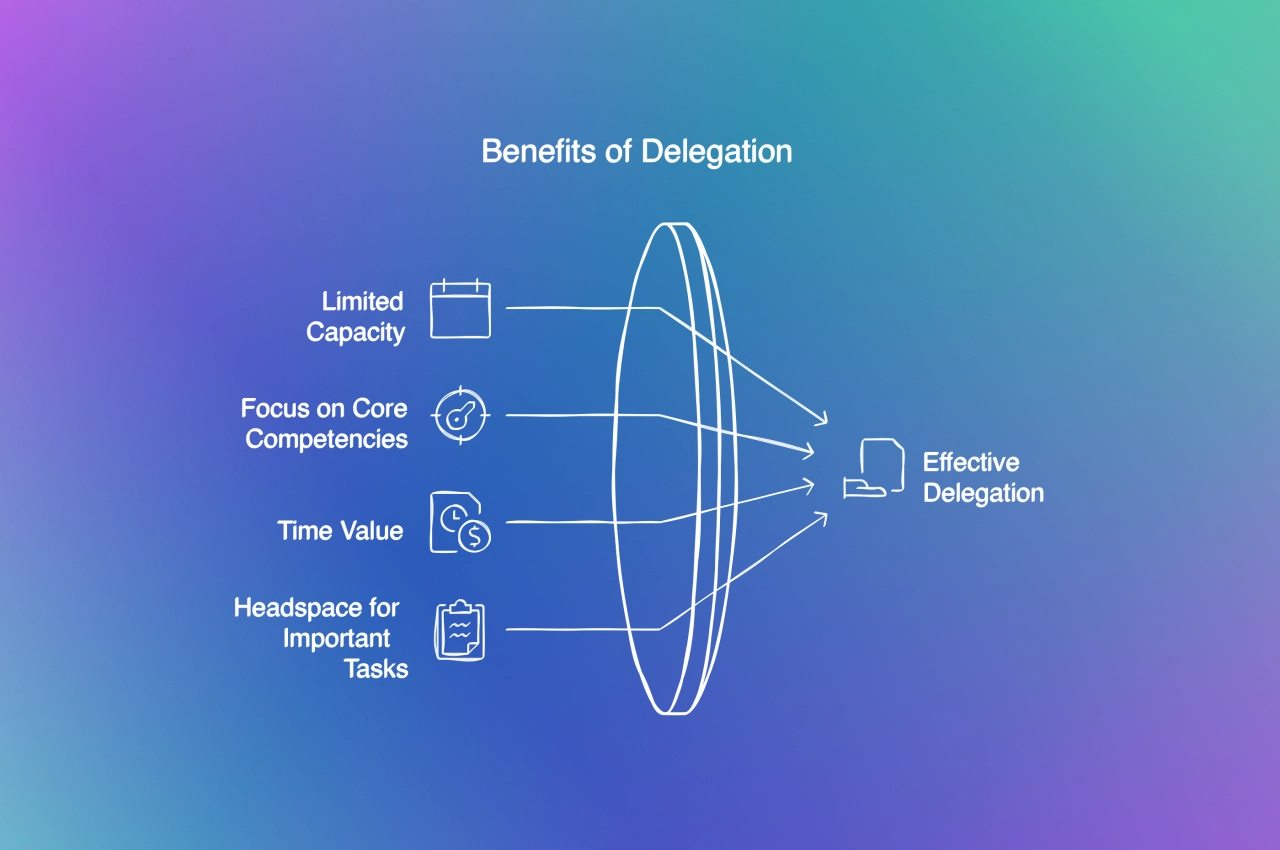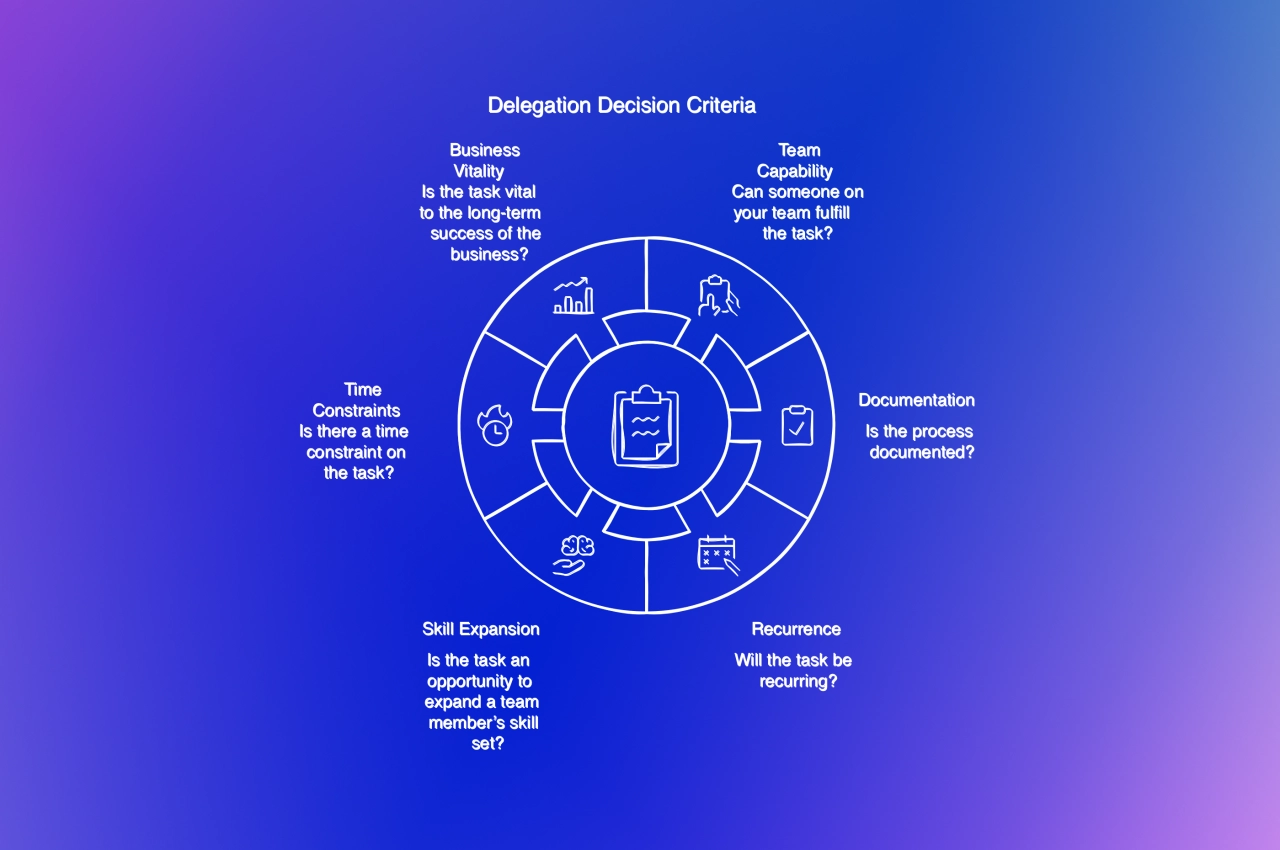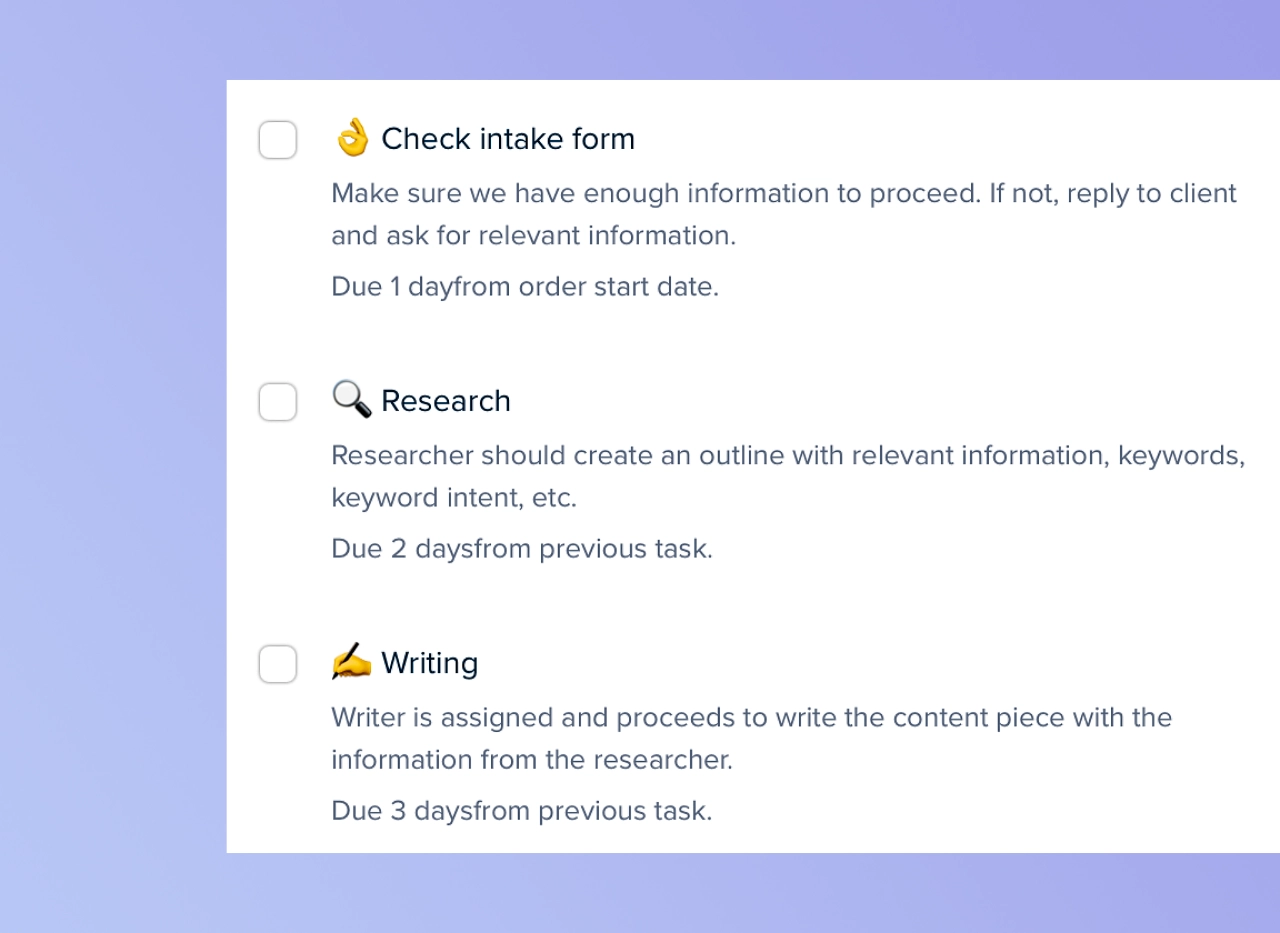- Learning how to delegate tasks effectively allows you to handle more clients, focus on core competencies, and get more value out of your time.
- Consider factors such as whether someone on your team can fulfill the task, if it's recurring and can be trained, if it can expand a team member’s skill set, if there’s a time constraint, and if it's vital for long-term success.
- Document processes, support your team, enforce accountability, stay focused on important tasks, and build fruitful relationships based on trust and empathy.
When you think about how to build an agency team, does it cross your mind to delegate tasks? Theoretically, there should be no better feeling than clicking the assign button on an order, knowing your team will handle it from here on out. Unfortunately, for many founders, it’s often hard to relinquish control of their business’s core competencies.
Even if you’re not ready to have someone else handle client orders just yet, you can start by delegating specific tasks. Learning how to delegate effectively will help you handle more clients and ultimately grow your agency.
What is delegation?
The concept of delegation encompasses offloading tasks to other people (in your team or external collaborators). In most cases, a task is delegated when someone else is better suited to do it, or if you need to focus on more important things.
The tricky part is knowing when to delegate, which is an art in itself. Those who’ve mastered it are better managers because they can let go of the micromanaging concept. Plus, they are able to involve team members in business processes, educating them, helping them learn new skills, and preparing them to take on more responsibilities.
Those who’ve improved their delegation skills not only lead happier teams, they also generate 33% more revenue, according to a study published by Gallup. The results quickly speak for themselves as the company embraces teamwork, improves their time management, and is powered by motivation instead of supervision.
Why is it so important to delegate?
Lots of leaders struggle to delegate work. There’s often a nagging sense of doubt that prevents them from letting go of their control over an outcome.
Will the task be done correctly?
Will the quality be on par with what I expect?
What if something goes wrong?
When you combine the mental effect of these doubts and the simple fact that delegation demands a bit of effort up-front, it’s not hard to see why so many founders decide to handle their work themselves.
There’s a pretty clear problem with this approach, though—you have a limited amount of time and energy to devote to your company. It doesn’t matter how early you set your alarm, there are always going to be tasks that get pushed down the pipeline.
So, delegation is really a matter of getting your priorities in order. It’s the process of determining which tasks are essential for you to complete, which ones can be completed by someone else, and which ones can be ignored altogether.
A founder who feels the need to micromanage every task or project within their business:
Isn’t giving their full attention to any task
Isn’t thinking about the bigger picture (i.e., which tasks will have the more significant impact)
Is stressed about the small things with no clear sense of what to prioritize
When you’re first starting out, it’s natural to want to do everything yourself. You’re the one who knows the most about your business and its goals, so it makes sense that you would want to be the one in charge of making things happen.
But as your company grows, you’ll quickly realize that there’s only so much you can do on your own. You’ll need to learn to delegate a task you don’t have time for to members of your team if you want to scale.
Setting up a delegation process is important because:
there’s only so much you can do yourself
it allows you to focus on your core competencies
it helps you get more value out of your time
it provides headspace for more important tasks

Which tasks should you be delegating?
While delegation can help your business scale, delegating everything is usually a recipe for disaster. So, how do you distinguish the tasks you can delegate from the ones you can’t?
The delegation process involves systematically thinking about different tasks and responsibilities within your workflow and running a kind of cost-benefit analysis that keeps each individual’s workload in mind.

To help you out, I’ve written a few guiding questions that will help you make the call:
Can someone on your team fulfill the task? There are always going to be some task that only you can do (more on that later). If someone on your team can get the work done (either with their current skill set or after a bit of training), it’s time to delegate.
Is the process documented? If it is, you most likely will have an easy time to delegate the work.
Will the task be recurring? If the task occurs again similarly in the future, it’s an excellent opportunity to train someone to complete it for you going forward.
Is the task an opportunity to expand a team member’s skill set? By taking the time to train them now, you could save a lot of time down the line. Plus, offering education and advancement opportunities plays a huge role in employee engagement.
Is there a time constraint on the task? If you want to delegate a task because of a looming deadline, you’ll need to leave enough time to provide training, answer questions, provide answers, check on the progress, and rework the completed task if needed.
Is the task vital to the long-term success of the business? Some tasks may require your personal attention. For example, if the task is essential for the long-term success of your service, you might need to devote some attention to it.

If you can confidently say any of these bullets apply to the task at hand, delegate the task and focus on other aspects of your business.
When should you start delegating tasks?
The answer to this question depends on a few factors, including:
the size of your team
your leadership role
the complexity of your business
the number of tasks beyond your core competencies
If you’re a solopreneur or have a very small team, it might make sense to handle most tasks yourself. Once you start growing and taking on more clients, you’ll need to think about how to delegate tasks effectively.
As your operations become more complex, you’ll also need to assign work to others. This is because complex businesses require different people to specialize in different areas. For example, you might have someone who handles finance, someone who handles marketing, and someone who handles operations.
No matter how big or small your business is, though, there will always be some tasks that only you can do. These are your core competencies—the things that make your company unique.
As a general rule, the more time you can devote to your core competencies, the better. That means your goal should be delegating as many tasks that are outside your core competencies as you can (safely) delegate. This will free up your time so that you can focus on the things that only you can do.
How to delegate tasks effectively
Here are tips for managers who want to delegate well and want to become an effective leader.
Document processes: Set up documentation for anything related to your business, from software used to the strengths of individual team members.
Support people: Make sure that your team knows that they can always ask you questions if needed, or provide communication channels where other team members can help individuals.
Enforce accountability: When you transfer authority, your team should know that it’s their responsibility to ensure that tasks get done. If mistakes are made, they should document and learn from them.
Stay focused: Delegating a meeting in order to replace it with another one isn’t how it works. Use that time to work on a more important task instead.
Build relationships: When you’re delegating, you’re not just making use of someone’s skills. You should build a fruitful relationship through trust and empathy.

Create & assign tasks with due dates.
Delegation FAQ
What are the principles of effective delegation?
The main principles include defining the task, the desired outcome, provide documentation, and verifying the work done while trusting the assigned person to complete the task. Once the task has been completed, provide valuable feedback and encouragement.
What is an example of effective delegation?
An example would be to assign tasks that the person is well-equipped to do based on pre-existing documentation, for instance copying a blog post into a CMS, formatting the content, adding internal links, and publishing it.
What is an effective way of delegation?
In order to effectively delegate, the task should be clearly defined and assigned to the right person. Not only will they complete the task successfully, they’ll also develop new skills you can make use of.
What are the different reasons why managers may resist delegation?
Managers may resist delegation due to concerns about loss of control, fear of mistakes, perfectionism, or a need for micromanaging. Additionally, some individuals might struggle with delegating tasks that require trust and empowerment.
What are the potential negative impacts of refusing to delegate?
Refusing to delegate can lead to burnout, decreased productivity, and strained relationships with team members. It also hinders career advancement opportunities, limits growth, and creates a culture where employees feel undervalued and unsupported.
How does patience play into effective delegation?
Patience is essential for effective delegation as it allows managers to trust their team members, give them the necessary autonomy, and provide constructive feedback. Without patience, delegation can become an onerous task that stifles growth and learning.
How does giving credit where it's due impact future delegations?
Giving credit where it’s due has a positive impact on future delegations by fostering trust, encouraging team members’ growth, and promoting a culture of recognition and appreciation. It boosts morale and motivates employees to take ownership of projects.
Start your task delegation today
While delegation can be complicated at times, knowing how to delegate the right tasks with these tips will help you get more done. Knowing the processes and understanding perfection isn’t always an option will help, but learning from your experiences and making any necessary adjustments for improvement will assist you in improving how you delegate tasks to the right people.





